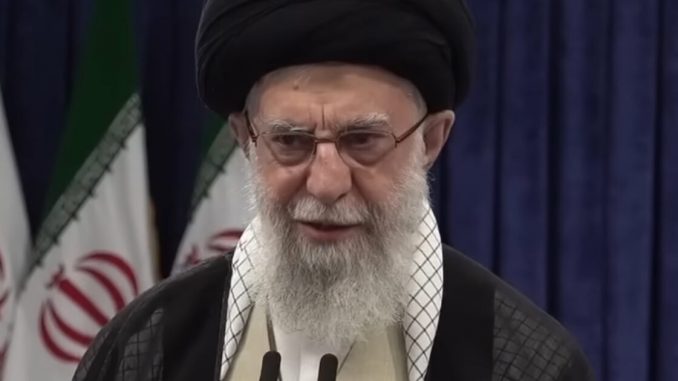
Ayatollah Ali Khamenei is currently in hiding / photo via a previous sermon
| Published June 20, 2025
In a bold and unprecedented escalation, Israeli forces launched precision airstrikes on Tehran’s Lavizan district—an area long rumored to house one of Iran’s most fortified military complexes. But this strike wasn’t aimed at just any installation. Intelligence sources suggest the real target was far more consequential: a heavily fortified underground bunker where Supreme Leader Ayatollah Ali Khamenei was reportedly sheltering. Utilizing advanced bunker-busting bombs, the attack sent shockwaves through Iran’s leadership and the region, raising fears of a broader confrontation and signaling that even the most protected command centers are now within reach.
🔒 Underground Fortress in Lavizan
According to multiple regional and Western intelligence reports, Israel executed a series of precision airstrikes targeting Tehran’s Lavizan neighborhood early on June 19. The focus wasn’t ordinary infrastructure—it zeroed in on a suspected underground bunker believed to house the Supreme Leader, Ayatollah Ali Khamenei, along with key IRGC commanders.
💥 Munitions Designed to Penetrate
What sets this attack apart is not just the target, but the tools: bunker-busting munitions. Eyewitnesses in Tehran reported heavy, deep explosions accompanied by black smoke—hallmarks of bombs meant to punch through reinforced earth and concrete .
Local reports of multiple Israeli precision strikes targeting the Lavizan neighborhood in Tehran. pic.twitter.com/UrRRbxtZBW
— Ariel Oseran أريئل أوسيران (@ariel_oseran) June 19, 2025
Some unofficial Twitter accounts claim Israeli strikes hit Tehran’s Lavizan area, where Khamenei’s bunker is believed to be. No confirmation of his death yet.#IranVsIsrael #IranIsraelWar #Tehran #Khamenei #Israel #Iran pic.twitter.com/3QXMgMERLq
— Ashish Pandey (@aspandey07) June 20, 2025
Iranian reports of Israeli strikes currently hitting Tehran, including the IRGC-linked Imam Hussein University, with ongoing air defense activity over the capital. pic.twitter.com/LJ51Hfs4D4
— Ariel Oseran أريئل أوسيران (@ariel_oseran) June 19, 2025
🕵️ A Deliberate Message
-
Strategic deterrence: Hitting a bunker isn’t just about destruction—it’s a strategic statement. Israel appears determined to signal that even the deepest, most fortified hideouts aren’t safe.
-
Calculated restraint: Some diplomatic sources suggest Israel deliberately avoided assassinating Khamenei on the initial strike, possibly to leave room for Iran to de-escalate.
📍 Bunker Depth & Technical Challenges
Lavizan is notoriously rumored to contain IRGC command bunkers—dug deep and reinforced. These locations are designed to withstand top-tier munitions. Deploying bunker busters implies that Israel had both the credible intelligence and ordnance capability to break through hardened defenses.
 Implications
Implications
1. No Leader Is Untouchable
Targeting a facility reportedly housing the Supreme Leader is a clear message: Israel can reach anyone, anywhere. This undermines the perception of absolute security around Khamenei and shakes Iran’s internal narrative of invincibility.
2. Strategic Shift Toward Decapitation Strikes
The use of bunker-busting bombs suggests a tactical shift from targeting infrastructure to potentially neutralizing key leadership figures. This raises the risk of sudden regime destabilization if such strikes succeed.
3. Heightened Risk of Retaliation
Iran could interpret this strike as an attempted assassination of its supreme leader. If confirmed, it may trigger a major escalation—through regional proxies like Hezbollah or direct ballistic responses, including potential strikes on Israeli or U.S. assets.
4. Erosion of Deterrence Structures
This strike highlights a new vulnerability in Iran’s deep-buried military and command sites, many of which were considered beyond reach. It may force Iran to rethink its entire defense doctrine and relocate high-level leadership structures.
5. Global Security Repercussions
The international community, especially U.S. allies in the Gulf and Europe, now face a dangerous tipping point: a broader regional war could erupt if either side miscalculates. Diplomatic backchannels may be working urgently to prevent an all-out conflict.
 Overall Takeaway:
Overall Takeaway:
The reported Israeli strike on Ayatollah Khamenei’s suspected underground bunker in Lavizan marks a dangerous turning point in the shadow war between Israel and Iran. With the use of bunker-busting munitions and a direct challenge to Iran’s supreme leadership, the message is clear: no target is too protected, and no red line is permanent. As both sides weigh their next move, the world watches on edge—aware that one strike beneath Tehran could ignite a conflict far beyond its borders.





Be the first to comment